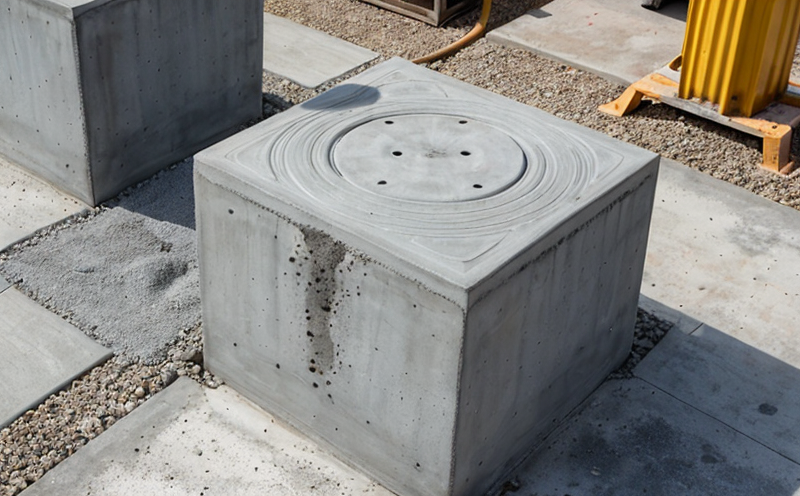ASTM C109 – Mortar Mix Design Verification
The ASTM C109 standard provides a method to determine the compressive strength of mortar. This test is crucial in ensuring that concrete and masonry materials meet specified performance requirements, particularly for structural integrity and durability.
Mortar mix design verification using ASTM C109 involves the preparation of mortar specimens under controlled conditions according to the standard's specifications. The specimens are then tested for their compressive strength at specified ages (28 days being the most common). This ensures that the produced mortar meets the required strength and durability standards.
The process begins with precise measurement and mixing of cement, fine aggregate, water, and other admixtures as per ASTM C109. The specimens are formed into standard cylinders or prisms, cured under controlled conditions, and tested for compressive strength using a compression testing machine. The results provide critical data that informs the mix design adjustments to meet project specifications.
ASTM C109 is widely used in construction projects where high-quality mortar is essential. It ensures consistency across batches of mortar, which is vital in large-scale construction projects such as bridges, buildings, and industrial facilities. The test results are often used in quality control processes, compliance audits, and research and development activities.
The ASTM C109 standard has been recognized internationally for its reliability and accuracy. Compliance with this standard ensures that the mortar produced meets global engineering standards, which is particularly important when working on international projects or when collaborating with foreign contractors and suppliers.
Understanding the parameters of ASTM C109 can help in optimizing mix designs to achieve both strength and cost-effectiveness. By using this method, construction professionals can ensure that their materials meet not only local but also international standards, enhancing the overall quality and safety of buildings and infrastructure.
Applied Standards
The ASTM C109 standard is applied in various sectors to verify mortar mix design. It ensures consistent performance across different projects by providing a standardized method for testing compressive strength. This is particularly relevant in the building & infrastructure sector where concrete and masonry structures are critical.
Engineers, architects, and construction professionals rely on ASTM C109 to ensure that mortars used in their projects meet the required standards. The standard covers the preparation of specimens, curing methods, testing procedures, and interpretation of test results. By adhering to these guidelines, practitioners can guarantee that the mortar they use is reliable and meets the necessary specifications.
The ASTM C109 method is also applicable in research and development environments where new formulations are being tested. It provides a consistent framework for evaluating the performance of different mix designs under controlled conditions. This ensures that any modifications made to existing formulas or the introduction of new materials do not compromise the integrity and durability of the mortar.
In compliance audits, ASTM C109 serves as a benchmark against which actual samples are compared. It helps identify whether deviations from standard practices are within acceptable limits or if adjustments need to be made. This is crucial for maintaining high-quality standards across various construction projects.
The application of ASTM C109 in procurement processes ensures that suppliers deliver materials that meet the required specifications. By specifying this standard as a requirement, buyers can ensure they receive consistent and reliable products from their vendors. This promotes transparency and trust within supply chains, enhancing overall project quality.
Industry Applications
| Application Area | Description |
|---|---|
| Bridges & Highways | Mortar used in bridge decks and highway structures must meet strict strength requirements to withstand heavy traffic loads. |
| Buildings & Skyscrapers | In tall buildings, mortar is crucial for the stability of walls and foundations. ASTM C109 ensures that the mortar meets these critical demands. |
| Industrial Facilities | For industrial plants, mortar used in construction must be robust enough to endure harsh environments and heavy machinery operations. |
| Road & Railways | Mortar for road surfaces and railway tracks needs to provide long-lasting durability. ASTM C109 helps ensure this longevity. |
The ASTM C109 standard is indispensable in these sectors, ensuring that the mortar used meets the stringent requirements set by each application area. Compliance with this standard guarantees consistent quality and reliability across all projects involving cement-based materials.
Environmental and Sustainability Contributions
- Mortar tested according to ASTM C109 reduces waste by optimizing mix designs for strength and durability, minimizing excess material usage.
- The standard encourages the use of recycled aggregates in mortar formulations, promoting sustainable practices in construction.
- By ensuring high compressive strength with less cement, ASTM C109 supports efforts to reduce carbon emissions from concrete production.
- Mortar prepared using this method can extend the lifespan of structures, reducing the need for frequent replacements and repairs, thus conserving resources.
The application of ASTM C109 contributes significantly to environmental sustainability by promoting efficient use of materials. It supports the development of greener construction practices that are environmentally responsible while maintaining structural integrity and durability.





